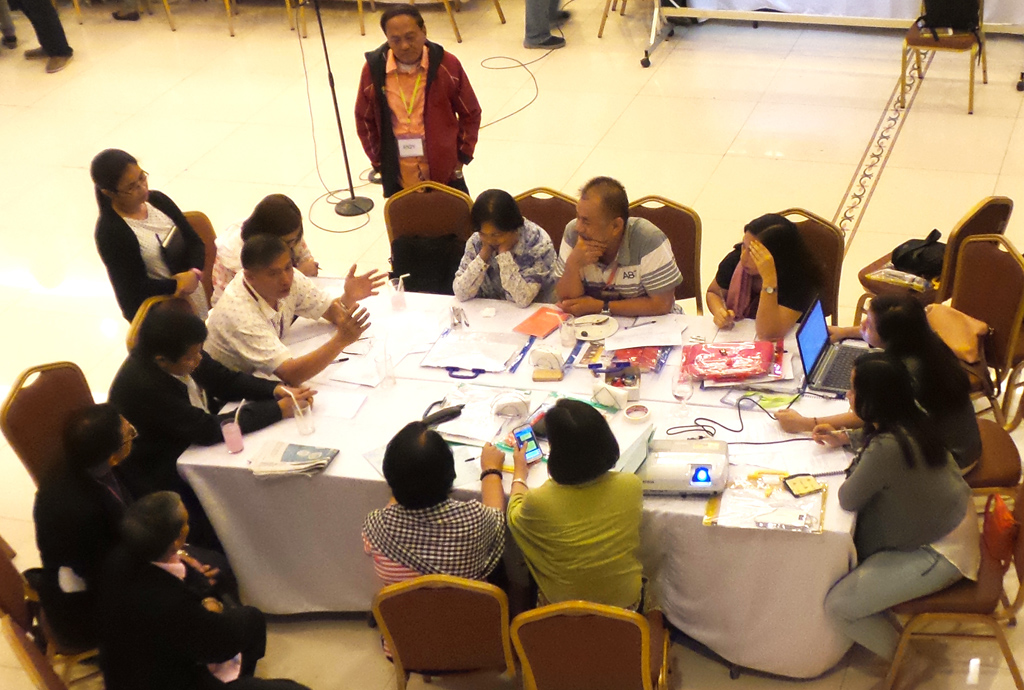
To ensure that there is a shared understanding and collective decision-making among PCAF, National Sectoral Committee (NSC), and Agricultural and Fishery Council (AFC), the agency jumpstart the year with a back to back performance review and planning workshop at Villa Caceres Hotel in Naga City on January 26 to 28, 2016.
The three-day event served as a venue to almost a hundred participants from the NSC, AFC and PCAF where they identified the gaps and issues that hampered the performance of the entire agency including its partners.
PCAF Executive Director Ariel Cayanan acknowledged the unceasing commitment and dedication of the AFCs and NSCs in pursuing an optimistic future for the agriculture and fishery communities.
“For the past 28 years, you have become our partners in developing sound policies for the agriculture and fishery sector. I encourage everyone to participate in identifying the gaps and create a common understanding that will be beneficial for the agency and to all our stakeholders,” Exec. Dir. Cayanan said.
Participatory Planning
As part of the planning and workshop, Exec. Dir. Cayanan also presented the agency’s accomplishment highlights from 2010 to 2014.
Among the highlighted activities were the creation of Climate Change Committee, AKBay Program, the formulation of Agriculture and Fisheries Modernization Plan (AFMP), enactment of Republic Act 10601 or the Agriculture and Fisheries Mechanization (AFMech) Law, AFMech Summit, and National Rice Summit.
The Policy Development and Coordination Division (PDCD) Chief Julieta Opulencia; Partnership Development Division (PDD) Chief Elgie Namia, and Planning, Monitoring and Knowledge Management Division (PMKMD) – Monitoring and Evaluation Section Chief Cyril Soliaban also presented the sections’ respective accomplishment reports for 2015.
Aside from the presentation of PCAF’s achievements, the Department of Budget and Management’s (DBM) reforms and status of fund transfers and balances were also discussed to update the participants.
PCAF also presented its 2016 Work Plan and Budget, and Key Challenges and Plan of Actions for fiscal year 2016 and 2017.
In line with the accomplishment reports and budget concerns, AFC members and partners from the NSC provided their recommendations and suggestions that could help the agri-fishery sector perform well and could be considered in PCAF’s 2017 work and financial plan.
Among their suggestions under the PAP1: Development and Coordination of Agriculture and Fishery Policies were allocation of fund for sectoral consultation in ARMM and all regions, and strengthening the participation and involvement of AFC particularly on the grassroots level.
They also proposed to conduct more policy studies that will involve grassroots levels of AFC like the Barangay Agriculture and Fishery Council and Municipal Agriculture and Fishery Council.
For the PAP2: Planning, Monitoring and Knowledge Management, they have included the development of local AFCs through formulation of road map, and the consolidation of resolution and categorized then into PCAF’s strategic legislative and executive agenda.
The conduct of entry and exit conferences for monitoring and other activities, and expanded monitoring in the local charters of NSC and newly organized MAFCs were also raised under PAP 2.
For the PAP 3: Partnership Development, the participants suggested comprehensive agri and fishery planning at the provincial level with participation of MAFC, MOA with other stakeholders to enhance partnership development with the province. They also suggested fishing ground planning and capacitating RAFCs to lead or co-organized congress or forum.
On the other hand, a workshop on the shared policy agenda setting was also conducted. The NSC together with the strategic concern committees, the regional and local AFCs identified their goals for the entire year. The participants were asked to identify the policy gaps and their priority for 2016 as well as their proposed solutions or options to the issues that they have determined.
Photo shows members of NSCs and AFCs together with representatives from PCAF gather around to work on setting goals for 2016, determine policy gaps, and propose solutions or options to the gaps.











